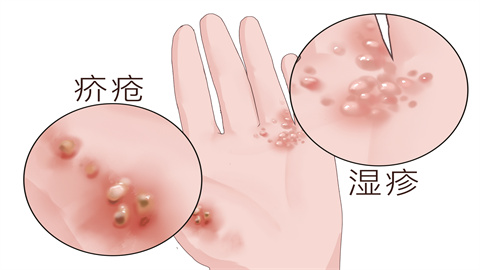What should I do if I get scabies?
Generally, scabies may be caused by direct contact with a person infected with scabies mites, indirect contact with contaminated objects, malnutrition, weakened skin barrier function, eczema, and other factors. It is recommended to seek timely medical attention, identify the cause, and improve the condition under a doctor's guidance through general treatment, medication, and other methods. The specific analysis is as follows:

1. Direct contact with scabies-infected individuals: Direct skin contact, such as shaking hands or sharing a bed with someone who has scabies, allows the mites to transfer to the body's surface and cause infection, manifesting as skin itching and rashes. Avoid continued close contact with infected individuals. Patients should live separately, wash the skin with soap and water after contact, change clothes, and disinfect them.
2. Indirect contact with contaminated objects: Contact with clothing, bedding, towels, or other items previously used by an infected person can lead to transmission of scabies mites and subsequent infection. Wash the patient's and family members' clothing and bedding with water hotter than 60°C, dry them using high-temperature drying methods, or expose them to sunlight for 4–6 hours. Disinfect furniture surfaces using chlorine-containing disinfectants.
3. Malnutrition: Long-term deficiency of nutrients such as protein and vitamins weakens the skin's resistance, leading to slower recovery after scabies mite infection. Adjust the diet by consuming more eggs, milk, lean meat, and fresh fruits and vegetables to replenish nutrients. If necessary, take medications such as compound vitamin B tablets, vitamin C tablets, and zinc gluconate oral solution as directed by a physician to assist in improvement.
4. Weakened skin barrier function: Frequent use of irritating cleansing products or excessive scratching can damage the skin barrier, making it easier to contract scabies mites. Stop using irritating cleaning products and apply medications such as vitamin E cream, urea cream, or petroleum jelly after bathing to repair the skin.
5. Eczema: Patients with eczema have long-term skin inflammation and poor barrier function, making them prone to concurrent scabies mite infection. Symptoms such as itching and rashes may worsen. Patients should use medications such as desonide cream, mometasone furoate cream, or hydrocortisone butyrate cream as directed by a physician to alleviate eczema symptoms.
In daily life, maintain a well-ventilated and dry living environment. Patients should regularly replace and disinfect personal items, and avoid sharing personal belongings with others. Wear loose, breathable cotton clothing to reduce skin friction. When experiencing itching, apply cold compresses for relief and avoid scratching to prevent secondary skin infections.





